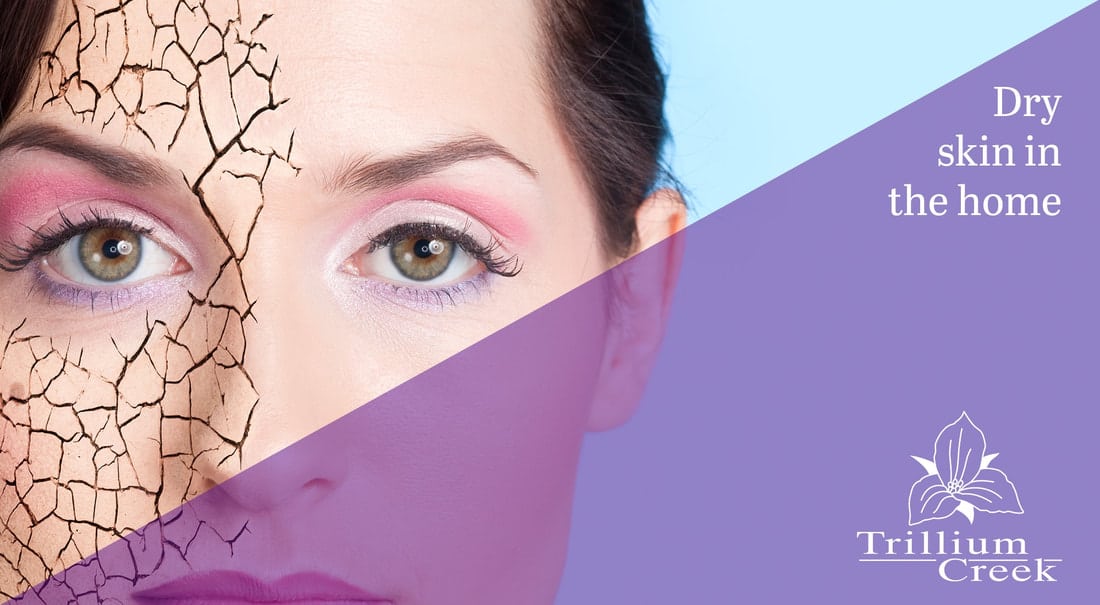
Winter is here and it does dry out your skin! But did you know there are everyday things you do or use in your home that could be causing your skin issues? Dry skin can happen at any age and sometimes, serious underlying issues may be at hand, so you should visit your dermatologist. But, if you have mild dry skin issues, incorporate these tips, tricks and changes in your home first!
1. Harsh soaps and detergents.
Many dish and laundry detergents are designed to strip oil away, which can leave your skin begging for it back. Tip: Use gloves while washing dishes. Changes: Many people over load on the amount of laundry detergent while doing laundry. Be sure to use the appropriate amount of detergent for your clothing and always let the rinse cycle run.
2. Your heater (fireplace, space heaters, basically anything that warms your home)
In the summertime, there is ample moisture in the air but in the winter, the air inside can be as harsh as the air outside on your skin. Trick: A humidifier could help with dry skin in extremely cold climates. Changes: As warm and toasty as it may be in front of the fireplace, limit your direct exposure, especially on your face.
3. Hot showers
Just don’t do it, especially in the winter! Tip: Limit daily showers to 10 minutes, with warm, not hot water. Always pat, not rub dry and use your moisturizer right away.
In certain cases, dry skin may need the help of a dermatologist. Extremely dry skin can be a warning sign of a more serious skin issue.
Dermatitis
Atopic dermatitis, or eczema, can cause an itchy rash or patches of irritated, dry skin. Eczema is classified in a number of ways: location, appearance, duration and possible cause. The most common forms of eczema, classified by type, are outlined below:
- Asteatotic Eczema: Caused by dry skin, particularly on the lower legs of elderly people. This is due to a reduction in sebum, the natural oil in skin that normally protects and moisturizes the skin.
- Atopic Eczema: Itchy rash most common on face and scalp, neck, inside of elbows, behind knees and buttocks. It is usually associated with allergies and asthma and tends to be inherited. Common in infants and toddlers, it may become less severe or disappear with age.
- Contact Dermatitis: An itchy rash caused when skin is exposed to an allergen or irritant such as poison ivy, metals and fragrances in daily products.
- Dyshidrotic Eczema: Small, intensely itchy blisters on the palms of the hands or soles of the feet, aggravated by daily activities.
- Keratosis Pilaris: A common condition causing rough, small, follicle-based crusts most commonly seen over large portions of the upper arms, thighs and buttocks. Results in rough skin that can be itchy.
- Nummular Eczema: An extremely itchy skin irritation that displays in coin-shaped patches of irritated skin, occurring sometimes after a skin injury or insect bite.
- Stasis Eczema: Red, irritated skin on the lower legs and is often associated with varicose veins.
The many, varied types of eczemas can make diagnosis difficult. In order to provide correct treatment, your Trillium Creek Dermatology skin experts will determine the exact type of eczema you have as well as its cause and get you quick relief.
About Trillium Creek Dermatology: Few places in the country offer the quality care, innovation and state-of-the-art procedures that are available at Trillium Creek. Through our integrative medicine approach, Trillium offers world-class general dermatology, dermatologic surgery, laser surgery, cosmetic dermatology, skin cancer treatment, Mohs surgery and holistic medicine.


